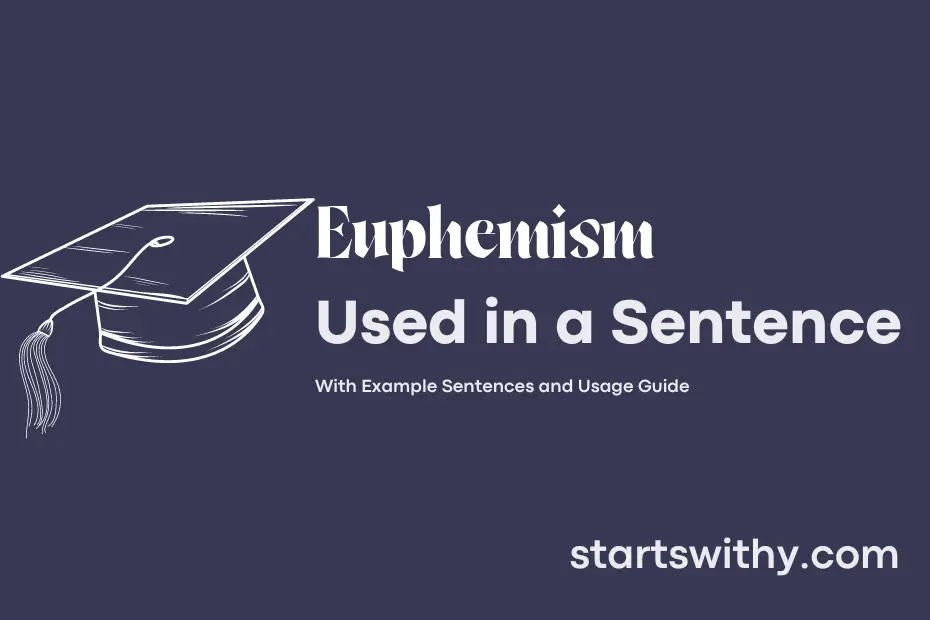Have you ever used a subtle, polite phrase to avoid directly addressing an unpleasant topic? This linguistic phenomenon is known as a euphemism. Euphemisms are mild or indirect expressions used in place of harsh or blunt ones to soften the impact of sensitive or taboo subjects.
By employing euphemisms, individuals aim to maintain civility, respect, or discretion in communication. These language substitutions can range from the humorous to the solemn, highlighting the versatility and nuance of human expression.
7 Examples Of Euphemism Used In a Sentence For Kids
- Euphemism is a polite way to say something.
- People use euphemism to make things sound nicer.
- Instead of saying something harsh, you can use a euphemism.
- Using euphemism can help us communicate kindly.
- Remember to choose your words wisely and use euphemism when needed.
- Kind words and euphemism can make others feel good.
- Let’s practice using euphemism in our conversations.
14 Sentences with Euphemism Examples
- Using a euphemism, he informed his professor that he was feeling under the weather and wouldn’t be able to submit his assignment on time.
- She decided to use a euphemism when informing her roommate that she had accidentally spilled coffee on her laptop.
- During the group project presentation, they employed a euphemism to soften the blow of criticizing their teammate’s contributions.
- Employing a euphemism, the student gently declined the invitation to join the committee, citing a busy schedule.
- Employing euphemisms, the college friends discussed the roommate’s loud snoring without hurting her feelings.
- When a classmate asked about his absence, he replied with a euphemism saying he had a prior commitment.
- The student used a euphemism to express dissatisfaction with the food served in the college canteen.
- He subtly gave feedback on his friend’s presentation using euphemisms to soften the criticism.
- Employing euphemisms, they discussed the need for more quiet study spaces in the college library.
- The professor used a euphemism to remind the students to turn off their mobile phones during lectures.
- When asked about his performance in the exam, he chose to reply with a euphemism to downplay his disappointment.
- She politely declined a social event invitation with a euphemism to signal her lack of interest.
- The college group used euphemisms to discuss the sensitive topic of mental health support on campus.
- The student tactfully used a euphemism to ask for an extension on the project deadline due to personal reasons.
How To Use Euphemism in Sentences?
Euphemism is a way of conveying a harsh or unpleasant idea in a more indirect or polite manner. It allows us to soften the impact of our words and make them more socially acceptable.
To use a euphemism effectively in a sentence, start by identifying the word or phrase you want to replace with a milder alternative. For example, instead of saying “She’s old,” you could use the euphemism “She’s a senior citizen.”
Next, choose a euphemism that conveys the same meaning but in a more tactful way. For instance, instead of saying “He’s unemployed,” you could say “He’s between jobs.”
Make sure the euphemism you choose is appropriate for the context and audience. Consider the feelings of the person you are speaking to and the impact your words may have on them.
Practice using euphemisms in everyday conversations to become more comfortable with them. Pay attention to how others use euphemisms and learn from their examples.
Remember that euphemisms can be a useful tool for communication, but be mindful of not using them to deceive or mislead others. Honesty and clarity should always be your top priorities in any conversation.
Conclusion
In conclusion, euphemisms are subtle language tools that help soften the impact of sensitive or uncomfortable topics. By using euphemisms, individuals can communicate difficult concepts in a more gentle and culturally acceptable manner. For example, phrases like “passed away” instead of “died” or “pre-owned” instead of “used” demonstrate the power of euphemisms in language.
Euphemisms can be found in various aspects of daily communication, including casual conversations, formal settings, and even in advertising. Understanding and recognizing euphemisms can enhance communication skills and help individuals navigate delicate subjects with tact and sensitivity. By utilizing euphemisms effectively, individuals can convey their message respectfully while being mindful of the feelings and perspectives of others.



